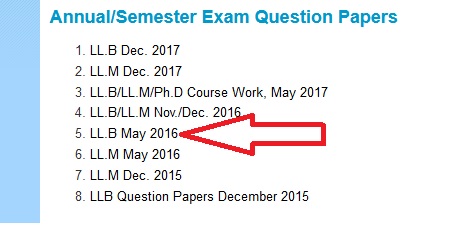mdurohtak.ac.in B.Ed.Exam Question Paper Model : Maharshi Dayanand University
Organisation : Maharshi Dayanand University
Exam : B.Ed.Exam Model Question paper
Document Type : Model Question Paper
Website : mdurohtak.ac.in
Download Sample Question Paper : https://www.pdfquestion.in/uploads/7488-B.Ed.Regular.pdf
MDU Rohtak Indian Society Model Paper
PAPER-I :
Objectives :
1. To enable pupil-teachers to understand the disciplie of education
in philosophical and sociological perspectives.
Related : Banaras Hindu University UET B.Ed. Science Model Question Paper : www.pdfquestion.in/13753.html
2. To enable them to understand the educational thoughts of some
Indian thinkers.
3. to make pupil teachers to understand the structure of Indian
Society and major concerns in the contemporary society.

4. To enable pupil-teachers to appreciate the role of education
in national development.
5. To create among pupil-teachers an awareness regarding futurology
of education.
6. To sensitise pupil-teachers towards emerging issues like promotion
of social cohesion, social democracy, secularism, environmental
degradation, human rights etc.
7. To enable student-teachers to act as agents of modernization
and social change.
Theory M.Marks : 80 Time : 3 Hrs.
1. Education and Philosophy
1. Philosophical Analysis of basic concepts of Education
(1) Education
(2) Teaching
(3) Instruction
(4) Training
(5) Indoctrination
(6) Types of Education-formal, Informal and Non-formal
Philosophy – knowledge
(1) Concept knowledge
(2) Types of knowledge
(3) Sources of knowledge
(4) Methods of acquiring knowledge
II. Educational Philosophy
1. Relationship between Education and Philosophy, Aims of education,
curriculum, methods of teaching, discipline and role of the
teacher as influenced by idealism, naturalism and pragmatism.
2. Educational thoughts of Mahatma Gandhi, Tagore and
Vivekanand and their impact on Indian Education.
III.Aims of Education in contemporary Indian Society
1. Education for :
(1) Values;
(2) modernisation;
(3) vocationalisation;
(4) health (physical, mental and emotional); and
(5) development of democratic outlook.
2. Agencies of Education
(1) Formal agencies; School and State
(2) Informal agencies; Home, community collaboration
IV. Structure and Concerns of Modern Indian Society :
1. Structure of India Society; class; caste; religion; ethnicity and
language,
2. Concern of Indian Society : Democracy, social justice and
equality, human rights, secularism, gender equality, social cohesion,
national integration, population explosion, environmental
degradation, globalization and privatisation.
3. Education and social change.
Education for National Development and its Futurology
1. Education and national development.
2. Meaning of national development.
3. Role of education in economic development.
4. Education and human resource development.
2. Futurology
Education in future India, schools, classrooms, teachers, methods,
discipline.

Psychology Of Teaching & Learning
Paper -II : Objectives
To help pupil-teachers to
1. Identigy the variables involved in teaching learning process so as
to infer their role in making instruction effective.
2. Understand various aspect of development during adolescent years
so as to be able to solve the problems of adjustment of their pupils.
3. Identify major approaches to learning and interpret them visa-vis
instructional/applications, so as to be able to facilities the learning
of their pupils.
4. Understand the needs of learner as individual and as member o
Class room group so as to be able to facilitate personal and social
development of their pupils.
5. Appreciate the need and significance of guidance and counselling
and to create and awareness of the approaches and strategies
concerned.
Theory : M.Marks : 80 Time : 3 Hrs.
1. Psychology and its Relationship to Teaching
1. Concept of Psychology
2. Concept of teaching and learning.
3. Relationship of Psychology to teaching and learning
4. Levels and factors affecting teaching.
II. Development of Learner
1. Concept of growth and development.
2. General principles of the development
3. Relative importance of heredity and environment in learner’s development.
PRACTICAL M.Marks : 20
Time : 1.30 Hrs.
1. Administrator scoring and interpretation of the following psychological tests.
PART-III A :
Objects :
1. To acquaint the student teachers with the historical background of secondary education in modern India.
2. To acquaint the student-teachers with the problems of education with reference to secondary Education Commission. Indian Education commission, National Policy on Education and Acharya Ram Murthi Committee Report.
3. To enable them to understand the constitutional obligation to education in India.
4. To enable them to understand the Secondary Education System in India U.S.A. and U.K.
5. To enable them to get acquainted with the concept of school management & management of human and material resources with specific reference to secondary schools in Indian context.
THEORY M.Marks : 50
Time : 1.30 Hrs.
UNIT-I (17 Marks)
Development of Secondary Education in india
1. Significant developments in secondary education during the preindependence period in India.
2. Review of secondary education in India after independence with special reference to :
1. Secondary Education Commission (1952-53).
2. Indian Education Commission (1964-66)
3. National Policy on Education (1986).
4. Acharya Ram Murthi Committee (1990).
5. Programme of Action
3. Constitutional obligations related to education in India and designed charges in the educational system with special reference to the secondary education.
General Aims of Secondary Education
UNIT-II : Secondary Education Problems & issues (17 Marks)
1. General aims of Secondary Education. Quality of secondary education with specific reference to its aims and objectives, curriculum, methods of teaching, human and physical resources, administration and evaluation.
2. Vocationalization of secondary education : its need and implication.
3. Distance education and open learning, Moral Education and Women Education.
4. Teacher education at secondary level : Pre-service and inservice.
5. Study of secondary education system of two developed countries : U.S.A. & U.K.
UNIT-II : (17 Marks)
School Management
1. Concept of school management
2. Management of human resources and material resources.
3. Construction of time table.
4. Class management
5. Maintenance of school records
6. Organisation of school library.
7. Organisation of co-curricular activities.